|
|
|
Sort Order |
|
|
|
Items / Page
|
|
|
|
|
|
|
| Srl | Item |
| 1 |
ID:
175231


|
|
|
|
|
| Summary/Abstract |
Based on the household-level dataset of 1472 rural households in China in 2015, this paper provides detailed patterns of electric appliance usage in rural China and examines the factors affecting it by using a multinomial logit model. Results reveal that rural households with higher per capita incomes, with large household size and dwelling areas, are more likely to purchase energy-efficient-labeled appliances than families with lower incomes, with small household size and dwelling areas. Rural households with higher education but relatively low incomes may be hampered in their purchase of energy-efficient appliances. Households using biomass are less likely to purchase appliances in general and energy-efficient labeled washing machine and TVs in particular. Findings suggest that providing subsidies to rural households for energy-saving appliances in rural China may encourage the choice of energy-efficient appliances.
|
|
|
|
|
|
|
|
|
|
|
|
|
|
|
|
| 2 |
ID:
144852
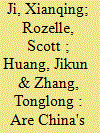

|
|
|
|
|
| Summary/Abstract |
China's agricultural sector faces challenges because most farms are still small scale. China's policy is to encourage the consolidation of farms and promote farms that are larger in scale. A question that arises is: Are China's farms growing? The goal of the present paper is to determine whether large farms in China have emerged or if farms remain small. To meet this goal, we systematically document the trends in the operational sizes of China's farms and measure the determinants of changes in farm size. Using a nationally representative dataset, the study shows that in 2013 China's farming sector was still mostly characterized by small-scale farms. However, at the same time, there is an emerging class of middle-sized and larger-sized farms. Most large farms are being run by households but there is a set of large farms that are company/cooperative-run. Today, farmers on larger farms are younger and better educated than the average farmer.
|
|
|
|
|
|
|
|
|
|
|
|
|
|
|
|
| 3 |
ID:
114577
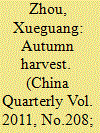

|
|
|
|
|
| Publication |
2012.
|
| Summary/Abstract |
For the peasants in rural China, the harvest season is the occasion when several different worlds - the business world of large companies, the entrepreneurial world of middlemen, local elites and peasant households - are compressed into the same social space, thereby inducing intensive economic and social interactions and crystallizing social relations among villagers, local elites and markets. Based on ethnographic research on the autumn harvest in a township in northern China, this study sheds light on distinctive modes of market transactions across produces, and diverse interactions between markets and local institutions involving different co-ordination mechanisms, rhythms and social relationships. A more nuanced image of market transactions emerges from these observations, calling for a more refined conceptualization of markets and further research on their implications for institutional changes.
|
|
|
|
|
|
|
|
|
|
|
|
|
|
|
|
| 4 |
ID:
124648
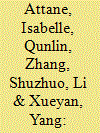

|
|
|
|
|
| Publication |
2013.
|
| Summary/Abstract |
Traditionally, marriage is a near universality in China. However, in the coming decades, owing to the growing sex imbalance, millions of men will be unable to marry. As a consequence, bachelorhood is becoming a new demographic concern, particularly affecting men from the most disadvantaged socio-economic groups. In China's cultural context today, heterosexual marriage remains a prerequisite for family formation and, in rural society particularly, the legitimate setting for sexual activity. Under such circumstances, bachelorhood is likely to produce privations on various fronts, the consequences of which for both the individual and the community are still largely unknown. This article focuses on the opinions and sexual behaviour of bachelors, and highlights significant variations from those of married men. It is based on the findings of an exploratory survey conducted in 2008 in selected villages in a rural county in Anhui province, referred to here as JC county. The survey provides insights into the more general situation of rural men unable to marry in a context of female shortage, and indicates the conditions a growing number of Chinese men will face in the near future.
|
|
|
|
|
|
|
|
|
|
|
|
|
|
|
|
| 5 |
ID:
153351
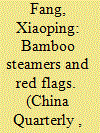

|
|
|
|
|
| Summary/Abstract |
This paper explores how the new Communist government developed a political consciousness of discipline and collegiality among traditional rural midwives in Chinese villages during the 1950s. It argues that selected traditional rural midwives were taught to observe discipline by attending meetings and studying, and to develop collegiality with peers through criticism and self-criticism of their birth attendance techniques and personal characters in short training courses from 1951 onwards. A legitimized midwife identity gradually formed in rural communities, but with it came conflicts and rivalry. By keeping these midwives under institutional surveillance and creating a dynamic and constant moulding process, the new government intended to foster professional and political discipline and collegiality within the group based on a normativized notion of selflessness performed within a changing series of indoctrination schemes that demonstrated continuity and complementarity and which I have described as common, preliminary, institutionalized, and dynamic schemes. This article examines how the state attempted to retrain marginalized and derided midwives with appropriate class backgrounds in order to incorporate them into the modern medical world, then still dominated by doctors and nurses with suspect class backgrounds. Ironically, in creating “socialist new people” to intervene in traditional rural birthing practices and introducing fee-for-service professionalism, the CCP accidentally created a degree of petit-capitalist thinking among women whose traditional mode of work may have been more selfless, thus complicating the process of indoctrinating selfless dedication.
|
|
|
|
|
|
|
|
|
|
|
|
|
|
|
|
| 6 |
ID:
162088
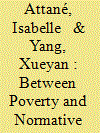

|
|
|
|
|
| Summary/Abstract |
This article is based on data from a study undertaken in 2014-2015 in rural southern Shaanxi to analyse the relationship between bachelors who have not chosen to be single and their satisfaction with life. Its aims are twofold: firstly, to explain the differences in the quality of life between married and single men by means of conventional variables (socio-economic profile, state of health, intensity of social relations); secondly, to explore quality of life factors associated with relations these men have with women and which, to our knowledge, have never hitherto been taken into account in analyses of inequalities in life satisfaction in China. In particular, we attempt to see the extent to which inability to contract a marriage is likely to affect quality of life, especially through the social injunction to marry and the social stigmatisation attached to bachelorhood, while at the same time exploring how quality of life varies in relation to the frequency of intimate relations with partners in a context where sex remains socially associated with marriage. In this way, we bring to light individual and contextual features that can be considered to contribute to the growth of inequality in life satisfaction resulting from socio-economic circumstances.
|
|
|
|
|
|
|
|
|
|
|
|
|
|
|
|
| 7 |
ID:
140836
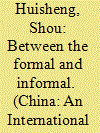

|
|
|
|
|
| Summary/Abstract |
Official efforts to improve rural governance in China have been confronted with resistance not only from local leaders but, interestingly, from rural residents as well. Two problems have jointly prevented these efforts from being effective: agency problems associated with formal institutions that split the interests of village leaders against their community, and collective action problems facing rural residents who are unable to defend their interests through horizontal societal networks. These two problems, working in tandem, allow village leaders to, ironically, enhance their control without being subject to state supervision and popular pressure. Some recent progresses have helped bridge the formal and informal institutions for greater accountability of rural leaders, although persistent challenges suggest an uncertain future for rural governance.
|
|
|
|
|
|
|
|
|
|
|
|
|
|
|
|
| 8 |
ID:
147422


|
|
|
|
|
| Summary/Abstract |
While it is widely accepted that industrialization has brought both environmental pollution and economic growth in rural areas of China, very little is known about whether the negative effects of industrial pollution on rural residents have been proportionally offset by positive effects due to improvements in off-farm income. This paper improves our understanding of these tradeoffs by conducting an empirical analysis based on a set of nationwide panel data collected in 2008 and 2012 and covering five provinces, 101 villages, and 2020 households. Evidence is found to suggest that it is not always the case that rural households that are affected by pollution reap the off-farm employment benefits associated with industrialization. Specifically, although industrial pollution incidence is found to be positively related with the level of local off-farm employment, this relationship is statistically insignificant when migrant labor is included. It can be explained as areas that less economically benefited from industrialization tent to have more labors migrated out and the average annual wage income of one migrant labor is much higher than that of local off-farm labor.
|
|
|
|
|
|
|
|
|
|
|
|
|
|
|
|
| 9 |
ID:
101273


|
|
|
|
|
| Publication |
2010.
|
| Summary/Abstract |
This article highlights the case of a rural north-east Chinese village where youth labour mobility is a marriage strategy deployed by parents and engaged in by young people given constraints on education and income in the countryside. While some rural mothers and their daughters do make the fairytale of "marrying-up" into an urban household come true, for most rural young women migrants the self-oriented consumption that they are encouraged to pursue free of rural domestic responsibilities sets them up for heartbreak when they are brought back for a rural marriage. As long as rural households are left to rely on the "insurance" of land and a younger generation to work it and provide labour of domestic subsistence, they will pull sons (and wives for them) back to the countryside, and try to marry daughters to urban households to expand their network of security. This new twist on an old managerial strategy sets up a tragic conflict: young men are encouraged to return to the countryside, while young women are pushed to provide a "uniting bridge" into the city and, when they fail, are brought back to the countryside for marriage. If the experiences of families in Huangbaiyu village are not an anomaly but signal a broader trend, a generation of returnee young women who are frustrated and angry in rural marriages and abandon their husbands and parents-in-law will dramatically influence the future of China's development.
|
|
|
|
|
|
|
|
|
|
|
|
|
|
|
|
| 10 |
ID:
145129


|
|
|
|
|
| Summary/Abstract |
The Rural Minimum Living Standard is an important component of social security in rural areas of China, as it provides social assistance to poor rural households. The country’s size and large development heterogeneities, however, make the policy’s implementation a challenging task. Using quantitative and qualitative data from rural households and administrators in five provinces, we identify the pitfalls of multi-level implementation along with the difficulty of measuring income in rural, underdeveloped areas as key sources of an implementation gap that has led to a considerable degree of misallocation of monetary transfers. Changes in the budgeting process and the distribution method might improve the anti-poverty effect of social assistance without having to carry out additional monitoring.
|
|
|
|
|
|
|
|
|
|
|
|
|
|
|
|
| 11 |
ID:
146517


|
|
|
|
|
| Summary/Abstract |
Ever since the introduction of the national political programme of “Building a new socialist countryside” (BNSC) in the early 2000s, renewed focus has been cast on how the Chinese government manages the gap between its rural and urban areas in the new millennium. Previous research has mostly studied the social and political consequences of the BNSC initiative without paying particular attention to its effects on public opinion. In this article, we present an analysis of the 2002 and 2008 waves of the mainland China subset of the Asian Barometer. Our results show a significant shift in the perceptions of the rural population in respect to how much impact government policies have on daily life. This shift brings rural perceptions more in line with those of the urban population in 2002. The paper concludes with the implications of our findings for the study of the relations between public opinion and public policy in China.
|
|
|
|
|
|
|
|
|
|
|
|
|
|
|
|
| 12 |
ID:
128166
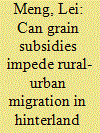

|
|
|
|
|
| Publication |
2012.
|
| Summary/Abstract |
In this paper I examine if China's grain subsidy program keeps farmers from engaging in migratory work using self-collected panel rural household survey data from Zhijiang, Hubei province. Making use of Zhijiang's unique geographical features, I construct a treatment and a control group and use a difference-in-differences methodology to identify the subsidy effect on migration. My results suggest that the grain subsidy policy does keep farmers at the rural origin.
|
|
|
|
|
|
|
|
|
|
|
|
|
|
|
|
| 13 |
ID:
163335
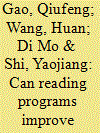

|
|
|
|
|
| Summary/Abstract |
In this paper, we attempt to evaluate the effectiveness of reading programs at improving the reading skills and academic achievement of primary school students in rural China. Using survey data on 4108 students, we find that students exhibited low levels of reading achievement, independent reading quantity, and reading confidence in the absence of any treatment. However, our results also suggest that properly designed treatments may improve the reading and academic outcomes of students. Specifically, we found that increased access to independent reading materials coupled with effective teacher training led to significant improvements in student reading skills, math test scores, and Chinese test scores. We believe that these improvements are due to changes in reading instruction and the attitudes of teachers toward reading. These findings indicate that encouraging higher reading quantity and providing high-quality reading instruction are important components for programs that seek to improve student outcomes in developing country settings.
|
|
|
|
|
|
|
|
|
|
|
|
|
|
|
|
| 14 |
ID:
141095
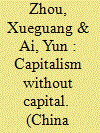

|
|
|
|
|
| Summary/Abstract |
Situated in an agricultural township in northern China, this study examines the rise of produce markets in rural China in the face of a chronic shortage of financial capital. Drawing on theoretical ideas in economic sociology, we explicate the mechanisms of gift exchange and credit taking and the conditions under which these mechanisms are used to mobilize financial capital and to facilitate market transactions in the absence of financial capital. We illustrate these issues and ideas using our fieldwork research on different produce markets and entrepreneurial activities.
|
|
|
|
|
|
|
|
|
|
|
|
|
|
|
|
| 15 |
ID:
122933
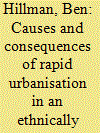

|
|
|
|
|
| Publication |
2013.
|
| Summary/Abstract |
In contrast with China's coastal regions, where rural urbanisation has largely been a result of industrialisation, urbanisation in the once predominantly rural towns of the interior is sometimes driven by local government policies. This article focuses on a case study of Zhongdian (Shangri-la), where urbanisation has mainly been driven by tourism. It shows that while the problem of land seizures has been generally less violent in this sparsely populated area of the interior, the urbanisation of this ethnically diverse area of northern Yunnan has generated a distinct set of problems. While local officials have strong incentives to pursue policies that promote urbanisation, they have few incentives to pursue policies that promote equal access to the new economic opportunities that accompany urbanisation.
|
|
|
|
|
|
|
|
|
|
|
|
|
|
|
|
| 16 |
ID:
121213
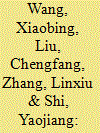

|
|
|
|
|
| Publication |
2013.
|
| Summary/Abstract |
The opportunity to attend college and earn a degree has increased dramatically in China. However, that does not mean that everyone has an equal opportunity. Historically, there has been well-documented systematic discrimination against minorities, women and the rural poor. The main question of this paper is whether or not this discrimination has persisted since the recent expansion of China's tertiary education system. Using a census of incoming freshmen from four tier one universities, this paper assesses if certain types of students are over-represented while other types of students are under-represented. Comparing the shares of students from different socioeconomic and ethnic backgrounds from our primary survey data with government generated census statistics, we conclude that poor, minority and rural female students are systematically under-represented. In contrast, rich, Han, urban males are dominant in college.
|
|
|
|
|
|
|
|
|
|
|
|
|
|
|
|
| 17 |
ID:
180630


|
|
|
|
|
| Summary/Abstract |
This paper studies consumption and income poverty in rural China during the period from 1995 to 2018 using Chinese Household Income Project (CHIP) data. It finds that the wellbeing of Chinese rural residents has improved significantly during this period as part of China's rapid industrialization and economic growth. The incidence of poverty has fallen substantially, either measured in terms of income or consumption. However, consumption poverty is not consistent with income poverty. It was the substantial growth of consumption or income that brought about the sharp fall in poverty, whereas the redistribution of consumption or income in particular during the period from 2002 to 2018 was unfavorable for poverty reduction. A large number of rural household workers moved away from household farming to participate in local or urban non-farming activities, resulting in a fall in poverty in the households that engaged purely in farming, and economic growth led to a sharp fall in poverty within different rural household groups.
|
|
|
|
|
|
|
|
|
|
|
|
|
|
|
|
| 18 |
ID:
095318


|
|
|
|
|
| Publication |
2010.
|
| Summary/Abstract |
In the aftermath of the famine in 1962, Mao Zedong took formal responsibility for the failure of the Great Leap Forward in the name of the central government. Thousands of local cadres were made scapegoats and were legally punished. This article focuses on the question of how the different levels of the Chinese state, such as the central government, the province and the county, have dealt with the question of responsibility for the famine. The official explanation for the failure of the Great Leap will be compared to unofficial memories of intellectuals, local cadres and villagers. The case study of Henan province shows that local cadres are highly dissatisfied with the official evaluation of responsibility. Villagers bring suffering, starvation and terror into the discourse, but these memories are constructed in a way to preserve village harmony. This article explains why these different discourses about responsibility of the famine are unlinked against the background of the "dual society"; the separation between urban and rural China. Finally, it will be shown that the Communist Party was unable to convince parts of society and the Party to accept the official interpretation.
|
|
|
|
|
|
|
|
|
|
|
|
|
|
|
|
| 19 |
ID:
094661
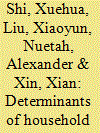

|
|
|
|
|
| Publication |
2010.
|
| Summary/Abstract |
This article uses multivariate regression and decomposition analyses to assess household income mobility determinants and their contributions to income mobility in rural China from 1989 to 2006. The findings indicate that households with lower initial income level, higher share of wage income, higher educational level of household members, larger number of non-agricultural employed household members and younger heads are more mobile. Moreover, besides initial income, change in the share of wage income, change in the share of non-agricultural employed household members, and change in average year of education of household members are the most important factors that account for income mobility. These findings necessitate more emphasis on policies that promote non-agricultural employment and education to enhance household income mobility in rural China.
|
|
|
|
|
|
|
|
|
|
|
|
|
|
|
|
| 20 |
ID:
161867


|
|
|
|
|
| Summary/Abstract |
This paper estimates the effects of a nation-wide rural electrification program in China using an informative dataset for 2459 Chinese villages. The combined propensity score matching and difference-in-differences approach is adopted to address potential selection bias. Accordingly, the program can significantly increase the net agricultural income per capita of farmers in the targeted villages. Moreover, matching grants with private assets and obligation labor force both can increase the effectiveness of the program. The program also highlights the complementarity between infrastructure and institution, in which the introduction of grassroots democracy will increase the effectivity of the rural electrification program.
|
|
|
|
|
|
|
|
|
|
|
|
|
|
|
|
|
|
|
|
|